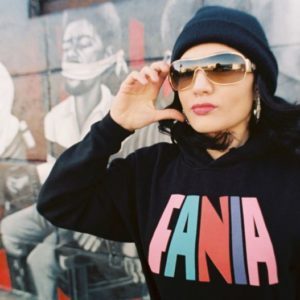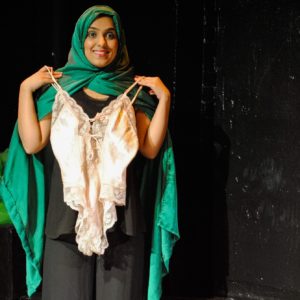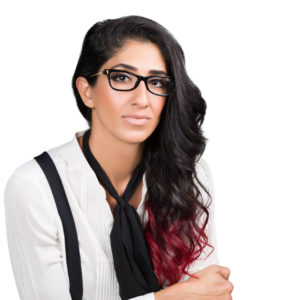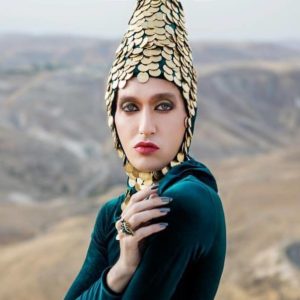There are so many international bands out there today who perform different fusions of music such as jazz funk played by Yemen Blues and A-WA but I’ve never gotten into them. That is before I heard the song Hinech Yafa performed by Light in Babylon’s Israeli-Iranian female singer, Michal Elia Kamal.
I felt an instant connection to the the santour and doumbek playing in the background (common in Iranian music) as well as Kamal’s voice, which resembles Iranian artists. These similarities led me to believe that Kamal is Iranian and after some research I discovered that Kamal is not just Iranian but Israeli-Iranian and was raised in Tel Aviv.
Today Kamal lives in Turkey and performs all over the world but what makes her music different isn’t just her background but her ability to unite different cultures and religions together through her music. Because Kamal draws her inspiration from authentic Iranian and Israeli melodies people from all over the Middle East can connect with her regardless of their political ideology.
To learn more about Kamal, where she draws her inspiration from and how Light in Babylon formed I reached out to her for an interview via Skype. I was already ecstatic to learn that Kamal is Iranian but more so when I discovered we shared other similarities such as our our affinity toward our Persian identity, our desire to fit in the Ashkenazi community and passion for sharing stories that bridge different cultures and demographics together. A story I hope you as the reader will enjoy and share.
Photos by Darius Kucys
 How did the band form?
How did the band form?
At some point in my life I realized I want to do music full time but was always educated to believe that is not a job but a hobby and that I need to do something else. But eventually I decided I can’t live like that anymore and left my university to embark on a musical journey. I traveled to India, different parts in Europe and then Istanbul, Turkey.
When I discovered Istanbul it was like a child discovering Disneyland and as a musician it meant a great deal of potential. I also met guitarist Julien Demarque, who today is my husband. We both have a passion for music and it was Demarque who suggested we begin playing in the streets, find a small room somewhere and see where it goes. I was very worried but he said, ‘no we can make a little money, we’re still young and have so many dreams,’ so I said ‘OK.’
At the time I also was searching for a musician who could play the santour but there are only a handful of people who know how. I did come across a few in Turkey and did not know if they were Iranian but one day Julien found this guy playing and he said let’s look for him. We spent days walking up Istanbul’s avenues and a week later we found Metehan Çifçi .
We approached him, he didn’t know English and we didn’t know Turkish but we just communicated and said ‘let’s play together.’ He said ‘yes,’ and after we played some songs we just clicked. You don’t always make a connection but with Metehan it felt right.
What has the journey been like?
I think from the moment we met Metehan and were playing on the streets to almost nine years later, where we are now performing in some of the best festivals’ in Turkey, it’s been a long journey. It’s not like a reality show, this is real life and it’s not enough to be a musician and a dreamer you need to be down to earth and plan your way step by step to see how you can become a professional.
You have to see your potential, because what do some people do now? They play in the streets, get a crowd, get a drink and have some fun and the money is gone. But we decided that we would save and invest. People eventually kept asking us do you have a CD and we decided to record an album and year by year we became more professional and even bought a book about how to manage your own band.
 How did you come up with the band’s name?
How did you come up with the band’s name?
There are two answers, the first relates to the story of Babylon and a time in which people were split into different cultures and languages that couldn’t communicate with one another. I think that is also how we saw ourselves as a band and describes the magic moment we all met.
I am Israeli and come from Jewish origins, Julien is French and has a Christian background and Metehan is from Turkey which is predominantly Muslim. We are all very different but in reality we’re not. We may not speak the same language but we can come together and represent a generation who wants to reconnect.
The second answer is that Babylon is a system or a reality, especially in Istanbul. People are waking up, going to work, coming back and just passing through the streets. No one talks to each other or looks the other in the eyes, everyone is just busy thinking about their own troubles or minding their own business. But when we perform in the streets we are actually creating light in all this darkness, we make people stop and gather and allow them to forget all their troubles. They start to smile and you guide them through all these emotions. I think that’s what constitutes Light in Babylon.
 What do you think sets Light in Babylon apart?
What do you think sets Light in Babylon apart?
We are not just sharing traditional folk music, we are sharing a piece of our soul and what we are doing is very personal and honest. We didn’t just jump into this industry with a manager we started from scratch and our music offers an emotional process. People who come to our concerts aren’t just saying, “wow, it was a great concert, we had so much fun,’ people are overwhelmed and I think it’s because they experience something deep inside.
We are living in a world in which emotions reflect a sign of weakness but we say no, emotions are our strength and my voice is strong. I try to show how you can be emotional and yet balance and direct your strength as a woman, as a Middle Easterner, as a Jew, as an Israeli and as an Iranian living in Turkey with two guys.
I think there is something here, and when you do something good you can tell from people’s reactions. We didn’t have a manager or label to push us, it’s only the music, we took the music put it on Facebook and for people in the streets and we saw what happened and I think that’s what makes us different.
 Where do you draw your inspiration from?
Where do you draw your inspiration from?
I guess it comes from home. People always ask me what my lyrics are about and they actually talk about my identity. You know people always ask you, ‘where are you from and what are your roots?’ It’s such a big question and I think I can’t be separated from my personal experiences.
Some people have also said that they sense some sadness in my songs and its true because my music is honest and reflects what I feel inside. The sadness is a result of many things but it mostly comes from stories shared by family members who have been disconnected from their roots.
My family is very happy living in Israel but they also are Persian, which is a strong culture and something they can’t disconnect with. So there is sometimes this sadness when they speak about their past in Iran. It’s almost like grieving or as if someone died, that death is Iran.
What did your parents think of you becoming a musician?
In the beginning it was a bit painful and I think they were devastated. They always asked me, ‘what are you going to do with yourself?’ My parents live in a good neighborhood in Tel Aviv and come from a very respectful and hardworking community and could not accept the fact that I was playing on the streets.
They couldn’t understand it because they have never witnessed something like this and they’ve never been there. For them it was something they did not want to speak about and did not want to share with anybody. They were very ashamed that I wanted to be a musician instead of a lawyer.
But after a few years they saw that I was becoming successful, receiving greater recognition, earning my own money and living in a respectful way and they began to accept it. I would even say today they are a bit proud.
 What was it like growing up Israeli-Iranian?
What was it like growing up Israeli-Iranian?
I grew up in Tel Aviv and in the early 90’s the area was very Ashkenazi and European. I was the only one with dark eyes and hair in my class and my peers thought I was from the enemy country.
In kindergarten the kids always used to ask me, ‘how is it that you are Israeli and your parents are Iranian? Your parents are your enemy?’ I was five years-old and a child asked me that, I was so confused.
I also grew up in a Persian home, my mother is from Esfhan and my father is from Tehran, they escaped the revolution along with other family members and had to give up the passports after the gates of Iran closed for them.
So when you visit a family member there is only Persian food and only Persian music and those sounds and scales were something I wanted to be a part of. It’s like I didn’t choose it, it chose me.
But it also helped me grow and understand there is beauty in many cultures, colors and sizes and to accept that everyone is composed of complex beauty and when we make music today, not only do Iranians and Israelis love it but also people from the United States, Turkey, Germany, Switzerland and Finland.

How did you learn to accept both your identities?
When I arrived in Turkey I met some Iranians who were the same generation as me and I was in shock. They spoke with the same accent as my parents and I found it so warm and beautiful and suddenly felt so comfortable. I felt that I had finally found peace.
 What have been Iranian’s reaction to your Persian songs?
What have been Iranian’s reaction to your Persian songs?
Thanks to my interview with Masih Alinejad from Voice of America and the discovery of my song “Women of Tehran” there was an explosion. A lot of Iranian people sent me poems and messages in Farsi which I got my mom to read to me one by one and she burst into tears because Iranian people don’t just write messages like “I love your music” but send flowers and heartfelt notes.
What have been Muslim people’s reactions?
I remember I performed in Istanbul where the crowd was predominately Muslim and were all wearing hijabs but they knew all the songs and they came back stage with flowers and said , ‘we love you’ and sent me letters which put me in shock after I read them.
These people probably voted for Erdogan but you know those things disappear and standing in front of you is this person. And that’s when I realized, hey, I am this Jewish, Israeli girl singing in Hebrew, I’m not singing in Arabic like Yemen Blues or in French I am singing the language in Israel and its shattering something and allowing different nationalities to unite. This is so powerful and it made me think who or what can unite people like this and I think it’s only honest music.
 What are the band’s future plans?
What are the band’s future plans?
We are getting busier year by year but mainly in Asia and Europe, we have yet to reach the United States and are taking it with one step at a time. Sometimes we work with agencies to help book us but we mostly do everything ourselves. Last month we also shot another music video in Istanbul named Canim Benim which means my darling in Turkish and are currently working on a new album which will have some Farsi songs. We are also in the midst of planning our spring, summer and fall tours.
How has the band evolved?
We started out as a trio but now have a Scottish percussionist Stuart Dickson and English bassist Jack Butler.
 Why do you think your music has become popular?
Why do you think your music has become popular?
I think we have arrived to a certain point at which a lot of young people like us want to find a common language and are tired of sticking with the common dialogue and ideas they already know. We are a generation who wants to travel and wants to meet and wants to see things in other places and I think we really represent that.






What a fascinating story behind the creation of Light in Babylon – great interview, Sarah!